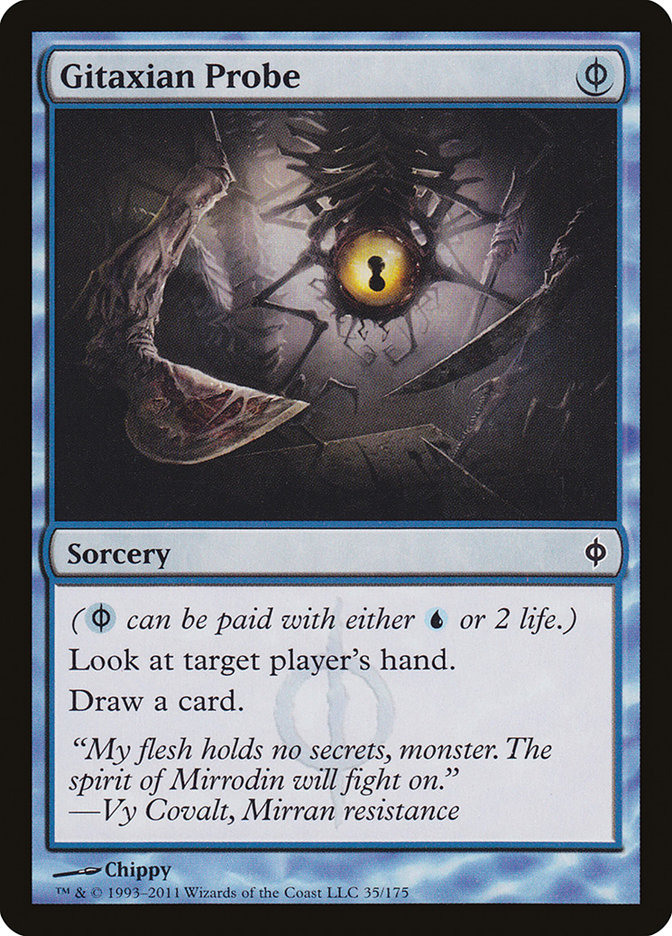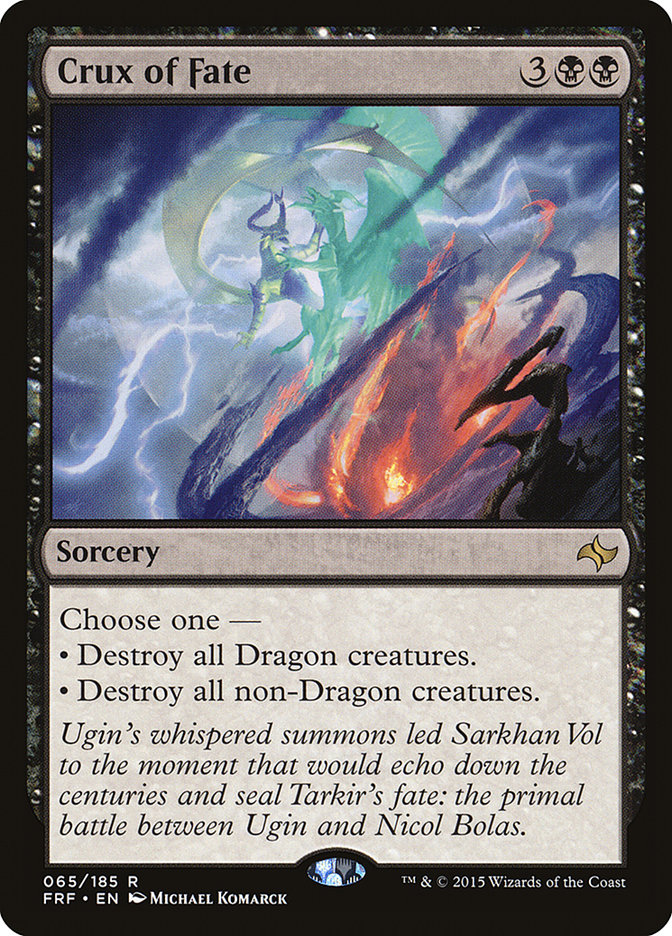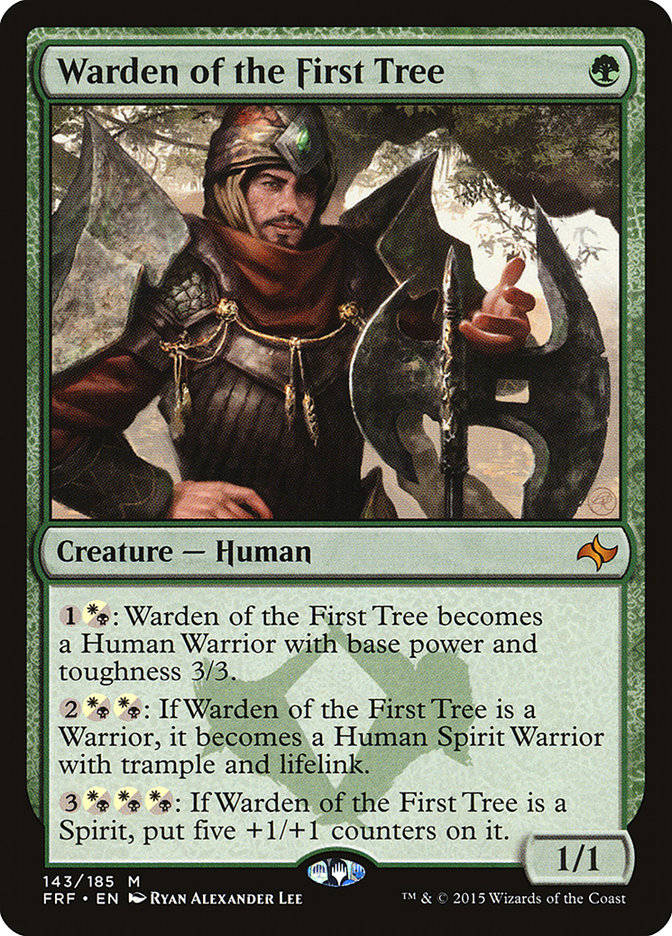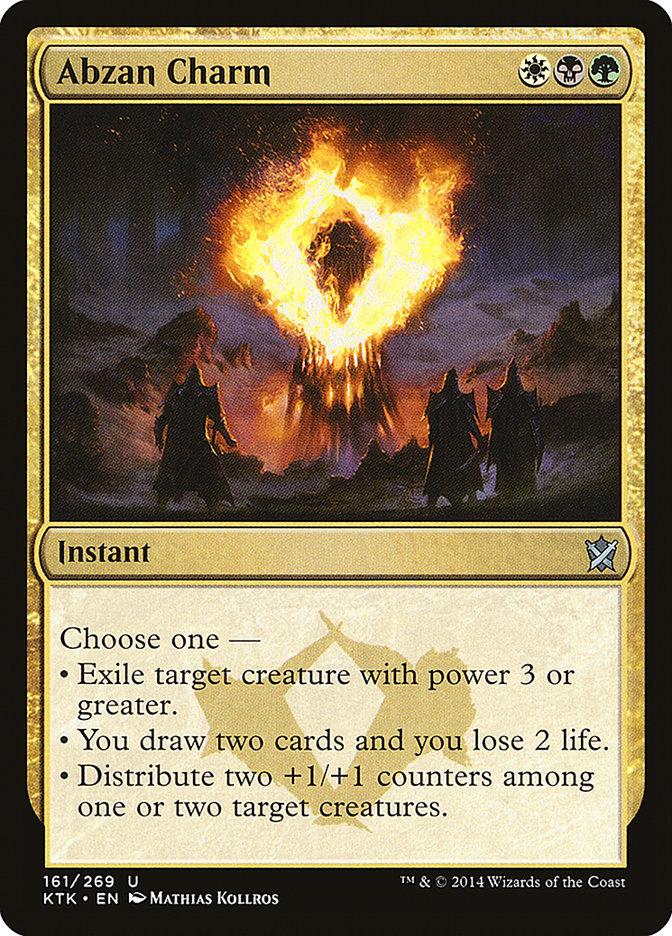At its core, Magic is a game of resource management. Successful players more often choose the cards, strategies, and lines of play that best leverage their draw steps, attack steps, and mana. This allows them to overcome variance more often than others and gain an edge, even if that edge may only be visible over a long period of time.
But there is a second element of Magic that makes it even more compelling: the battle for information. The reason the best lines of play are so difficult to find is because they are obscured by the possibility of what is in each player’s hand or on the top of their decks. Often a player is merely forced to choose which cards they want to beat and which cards will defeat them. Such a decision may be viewed as arbitrary as flipping a coin, but to the more experienced player, it is much more.
Over the course of every game of Magic there are a multitude of clues that the more observant player can use to their advantage, allowing them to make more informed and thus ultimately better plays.
We can see how important this advantage is through the card Gitaxian Probe. For the low price of one mana or two life you gain a large amount of information. This lets you sequence your cards optimally in an otherwise tricky deck like Legacy Temur Delver, or know absolutely whether your combo is safe to execute. It also makes cards that rely on information like Cabal Therapy or Meddling Mage much more potent.
It is this subgame which I intend to explore today, offering my perspective on how to best improve your skills in this area and which aspects of it are most over and underrated by average players.
Arm Yourself As Fully As Possible
It is impossible to find what you need when you don’t know what you are looking for. In Magic you need to know the range of possibilities in order to even start narrowing them down. That means having as close to an encyclopedic knowledge of the Constructed metagame or Limited environment you are playing in, including possible fringe variants of popular decks.
It does you no good to know that your opponent has Remand mana open if they are highly unlikely to have Remand in their deck, and often will do you harm. Sometimes your opponent’s opening plays are too generic to put them on a specific deck, but every piece of information helps.
For those of you who do not play every weekend, it can be useful to do a quick refresher on the format by running through recent top decklists or seeking help from friends. Maybe they can quiz you on the car ride to the event. (How many Shambling Vents are in the most popular list of Standard Abzan? What are the most common removal spells in Jeskai Black? Things like that.) Ideally you will be able to process this information with little energy so you can focus your efforts on more pressing matters, so practice here is important.
It seems trite to say that you should win the information war by memorizing information, but there really is no substitute for good preparation; the more you know going in, the more you will be able to notice and leverage in the game.
Mathematical Tools Can Be a Useful Baseline, But Not Much More
Those who know me are aware of my background in mathematics (a Bachelor’s degree for those who are unaware), and I imagine many might expect me to reduce this part of the game to a simple math problem. After all, it is possible with practice to make a reasonable estimate for the likelihood your opponent is holding a given card based on the number of cards they have seen over the course of the game and the number that remain unknown.
But to do so would be closing yourself off from a rich vein of information: your opponent. There are so many things your opponent may do over the course of a game—from ordering their hand in a certain way to consistently holding up certain mana over several turns that can force you to deviate from a mathematically derived estimate.
Ultimately, straight probability provides little more than a starting point from which to operate, if even that. It simply ignores too much to be practically applicable. The one area where mathematical tools are directly applicable is when accounting for the top of each player’s deck. For example, if you determine that your opponent is holding a Crux of Fate but is stuck on four lands (or a single black mana), it is useful to be able to estimate how likely they are to draw it over the next turn or two.
But today I am much more concerned with how you can come to determine they have the Crux than what to do about it. So I will leave you with the strong suggestion that you educate yourself on basic probability, specifically the hypergeometric distribution, which is the function that accurately describes drawing cards in a game of Magic.
Further education in mathematics will also improve your deductive reasoning skills, which lies at the center of the information war. Deductive reasoning is precisely what you are engaging in when determining unknown information from known, so while the specific tools may not be all that relevant, the skills gained in studying them certainly are.
Psychological Tools are Unreliable
The other place players often hunt for information is in physical cues, or tells. Unfortunately these clues are unreliable. People are quite varied in their behaviors, and while there are some common threads, it is dangerous to project these commonalities onto any given individual. Where one person may fidget in their seat as a show of weakness, another may do so as a show of strength. Still another may do so because the room is a little cold. With no baseline to compare to, there is not much to go on.
The key to remember here is that you are dealing with a single person. That person may behave differently than anyone else, but they will have specific patterns that they adhere to. What you should first seek to do is identify that player’s common patterns and establish a baseline. How do they arrange their lands? How do they draw their card? Are they particularly talkative? Fidgety? Calm? With this you can gain an idea of what normal is for your opponent. Only then can you determine what is not normal.
It is when things are not normal that your opponent will concede information. When someone who normally plays very quickly suddenly slows down after drawing their card, you can be certain that they drew something relevant. From there it is a simple matter of knowing their range of draws and analyzing the gamestate, and you should have a short list of possibilities for the card they drew.
Personally, I do not engage in much of this part of the game, perhaps to my own detriment. I am much more interested in clues that are more concrete and believe those to be the best way to gain a consistent edge in the information war. That will be my focus in the remaining sections.
It’s All in How They Sequence
A lot of information is given away almost unwillingly in a game of Magic simply by virtue of the cards you do play and the order in which you play them. At a competitive level tournament, you can almost always assume that your opponent has some semblance of how to play the game, especially with their deck. Moreover, it is generally obvious when this is not true, at which point the war for information is less important.
When your opponent is obviously sloppy, you will gain most of your edge from their operational mistakes (keeping poor hands, not using their mana effectively, sideboarding incorrectly, etc.), and they will generally offer you information freely. They are visibly demonstrative when their draw is particularly good or bad and telegraph their hand freely. Therefore, these tactics are dramatically more effective against higher level players who have a polished and thus more predictable pattern of play. Be careful when employing them at lower levels since you risk leveling yourself.
That being said, taking advantage of information leaks is an important tool in succeeding against top competition. Going into a match you should have an idea of how your opponent will approach it given their deck. And the decisions your opponent makes invariably are what they think is best, even if you may not agree. Your goal should be to deduce those reasons based on known information from the gamestate and apparent biases that your opponent has.
Let us consider a simple example:
Your opponent is playing Abzan Aggro against your Jeskai Black and has kept their opening hand in game 1. On the play they lead with Windswept Heath, Forest, Warden of the First Tree. On the second turn they sacrifice a Flooded Strand for a Plains, level their Warden, and attack for three. Your opening turns have only yielded a couple lands. On their third turn, your opponent attacks with Warden, plays a Llanowar Wastes, and passes the turn. What does that suggest about their hand?
The first card that should come to mind is Abzan Charm. It is the most powerful card they can cast with their mana and when cast to draw cards gives them more resources to guide their next few turns. It can also be cast as a removal spell on your turn should you play a Mantis Rider or Tasigur, the Golden Fang, allowing Warden to continue attacking.
But let us look a bit further. With your opponent solidly ahead against your slow start, they should be looking to advance their battlefield to press that advantage, especially against a deck that typically lacks sweepers. So by leaving up Abzan Charm, they are signaling that they did not have a way to significantly advance their battlefield. This means cards like Anafenza, the Foremost, Den Protector, or another Warden of the First Tree are unlikely to be in their hand, especially given the fact that they kept on seven cards.
The key realization here is that not extending another threat is too significant a cost for them to have reasonably paid, so the more likely scenario is that it was their only option.
Now unless Warden was their only threat, which is unlikely in a deck such as Abzan Aggro, it is more likely that your opponent has the more expensive threats in their hand, such as Siege Rhino or Wingmate Roc. Given this picture of their hand, I am highly unlikely to play Mantis Rider on my third turn even if it is in my hand, as I would much prefer to hold up a removal spell like Crackling Doom.
As a corner case, it is conceivable that your opponent is holding Abzan Charm because they are very afraid of taking damage from Mantis Rider. This either suggests that their draw is painful, meaning they likely do not have Siege Rhino and will be taking plenty of pain from their Llanowar Wastes. It could also suggest that they are trying to set up a Gideon, Ally of Zendikar for their fourth turn, so keeping the battlefield clear has value.
Deciding between these possibilities is an exercise in risk assessment. You should analyze your hand to determine which possibility is most threatening and then weigh your options accordingly. If your hand is removal-heavy, including an answer to Gideon, then perhaps you would rather let your Mantis Rider get Abzan Charmed and then mop up their battlefield before pulling ahead with a Dig Through Time. However, if Gideon is going to be a problem, you will want to save the Mantis Rider to pressure it.
This kind of advanced thinking is what separates the top players from the rest of the field. There is some percentage of games where you want to Mantis Rider on turn 3, and some where you should cast Crackling Doom, and consistently figuring out which is which makes all the difference.
What this skill amounts to is getting inside your opponent’s head and looking at the game from their perspective. This is quite difficult given that you have information they don’t (your hand, your specific list), but it is very important. As often as possible you should ask yourself “Why is my opponent making this play?” In testing you should be discussing these things with your teammates to see where your logic broke down and where you were spot on. Like any skill, you can improve your powers of deduction through targeted practice.
The other thing you are looking for is coherency. If turn after turn your opponent’s plays are suggesting the same thing, then your confidence should rise. The obvious example here is holding up a counterspell or combat trick. When your opponent is falling behind but stubbornly leaves 1U open, you can be assured they have Disdainful Stroke. But if they leave it up on one turn then quickly tap out on the next when they did not have to, feel free to call their bluff.
Every turn is a new chapter in the story they are telling you, and sometimes it will take a while for the story to emerge, but the rewards are there. Once their story coalesces and you gain a good sense for what your opponent is trying to do, you are looking for deviations. When your opponent breaks their normal patterns (i.e. quickly takes down Disdainful Stroke mana) is when they give up the most information and your goal is to be vigilant enough to notice.
As you have seen in the above example, this is not an exact science and the times where you narrow their range down to a single possibility are rare, but even winnowing it down to a few has plenty of value, since you should be able to consider each possibility and plan accordingly. As such, you will find yourself surprised and caught unprepared much less often and victory always favors the prepared.
Disguising Your Own Plays
The war for information goes both ways. As much as you can gain an edge by breaking down your opponent’s plays, you can also gain an edge by disguising your own as much as possible.
The best and simplest way to do this is to reduce as many of your mechanics as possible to habit. I see this most often in tapping lands. You want to represent as much as possible so tapping your lands efficiently is an easy way to plug information leaks. This means leaving your dual and tri lands untapped as often as possible (note that I am ignoring cards that can punish you for doing so, like Wasteland), instead opting to use your basics and colorless lands. But more than that you want to be able to do this instinctively so that your opponent does not pick up on what is happening. When you clumsily reach for your lands only to suddenly stop and adjust them, you give away more than if you had simply made the initial mistake.
As I noted in the last section, each turn of the game is part of a story your opponent is telling you, and figuring out that story is your primary goal in the offensive part of the information war. Similarly, on the defensive side, you need to be cognizant of the story you yourself are telling. Sure, it is obvious to you that you are slamming Dragonlord Ojutai on turn 5 because it is all you have, but your opponent does not know that. Nearly every turn you should take a few seconds to survey the battlefield and think about the game unless you are under severe time pressure. There may be something you missed before, a clue that went unnoticed or a possibility that you failed to account for. And more than that, you give your opponent more to think about. You never want to make it easy for them.
Given everything I have said, I would caution you to not take these concepts too far and let your desire to safeguard information get in the way of making technically correct plays. Continuing your Disdainful Stroke bluff should not stop you from wiping your opponent’s battlefield if that would give you a huge advantage. The edge you gain in the information war is significant but small, which is why I advise you make it habitual. You do not want it to radically alter your normal course of play. These are the finishing touches that take your game to the next level.
Don’t Be Afraid to Be Wrong. Trust Your Intuition.
No one ever improved by repeating the same play patterns over and over again. You have to be willing and able to adapt to different situations, willing to grow as a player by identifying weaknesses. The process of doing so is going to lead to mistakes and specifically mistakes that you may otherwise have not made. Losing games to such mistakes can be frustrating, but it is part of the process.
In this case you have to be willing to trust your deductions and make the correct play based on the newly gained information. Once you develop your skills in this area it will seep into your intuition. Much of your information processing is subconscious, and often you will see things without being fully cognizant of them. You have to be aware of this and put some trust into your subconscious brain.
It’s analogous to sensing the correct line of play from a given battlefield after playing hundreds of games with your deck—you don’t exactly know why the play is right, but it is likely because you have been in similar spots before.
Your brain retains all of this information, but you cannot always recall it in the moment. The best players know this and trust their intuition, while the good/not great players are constantly questioning this sense and rationalizing themselves out of making the best plays.
Once you have built your intuition to include these skills, the right play will begin to pop out at you, like some sort of spidey sense. It is a strange phenomenon at first, but learning to properly wield this sense is incredibly powerful. Trust your brain to do the thinking for you. That’s what it’s there for.





